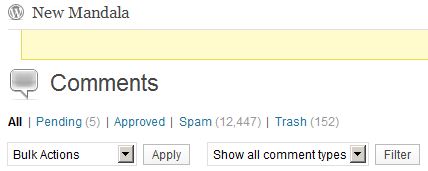New Mandala gets plenty of comments. As our long-term readers know some people out there consider them a mixed blessing. From where I sit they are a tremendous addition to this site and its collective effort to offer new perspectives on mainland Southeast Asia. Compared to some Thai language websites, however, we are a minnow in the comments stakes. Even in 2012 we have the luxury of “hand moderating” our comments. Some websites — especially very big and very busy ones — cannot afford that.
Since Chiranuch Premchaiporn was first accused of breaking the law for failing to delete comments on the Prachatai website quickly enough there have been increased concerns about the responsibilities of Thai webmasters when dealing with comments. This issue deserves serious scrutiny, especially from those who benefit from the vitality, insight and argument of online commentary.
Today, an article in the Wall Street Journal points out that:
[Thailand’s] 2007 Computer Crimes Act holds online intermediaries (web portals and the like) liable for illegal content posted by others…This law is particularly significant in Thailand because other laws, especially the lese-majeste laws prohibiting certain comments about the monarchy, can apply to many kinds of Internet communications…
After outlining the benefits of online communication, it goes on to argue that:
A poorly conceived law that targets the middleman website or portal jeopardizes all these advantages. Online bulletin boards, especially, are a huge source of information and hence build value. Pantip is Thailand’s largest, with an average of 4,600 new discussion topics per day. The information on those boards can help consumers to find the right prices, businesses to find the right customers, startups to get discovered and friends to connect. But how is an e-commerce site supposed to judge the risk of an illegal comment being posted in its product review section?
All this seems obvious and yet the Thai government is unlikely to repeal the law. A loosely defined law allows the authorities to prosecute intermediaries, rather than provide a clear framework that clarifies the risks and allows businesses and users to make informed decisions and reap the benefits of a thriving Internet economy.
For the government of Prime Minister Yingluck Shinawatra the growing chorus of disapproval about the Computer Crimes Act and related laws is surely an unwelcome distraction. I expect they feel somewhat paralysed and, with little room for aggressive change, have opted to take the proverbial path of least resistance.
Now this is where New Mandala commentators come in. You’re a web-savvy group and have, in many cases, many years of experience with websites and comment forums. Some of you have even been active on New Mandala for almost 6 years!
So how would you change the 2007 Computer Crimes Act to make Thailand’s Internet a place more conducive to debate, exchange and trade? Does this law need to be abolished or, given the constraints of the current government, is there some other effective way of neutering its negative impact on Chiranuch and all those like her?
Your thoughts, as ever, are very welcome.
 Facebook
Facebook  Twitter
Twitter  Soundcloud
Soundcloud  Youtube
Youtube  Rss
Rss 